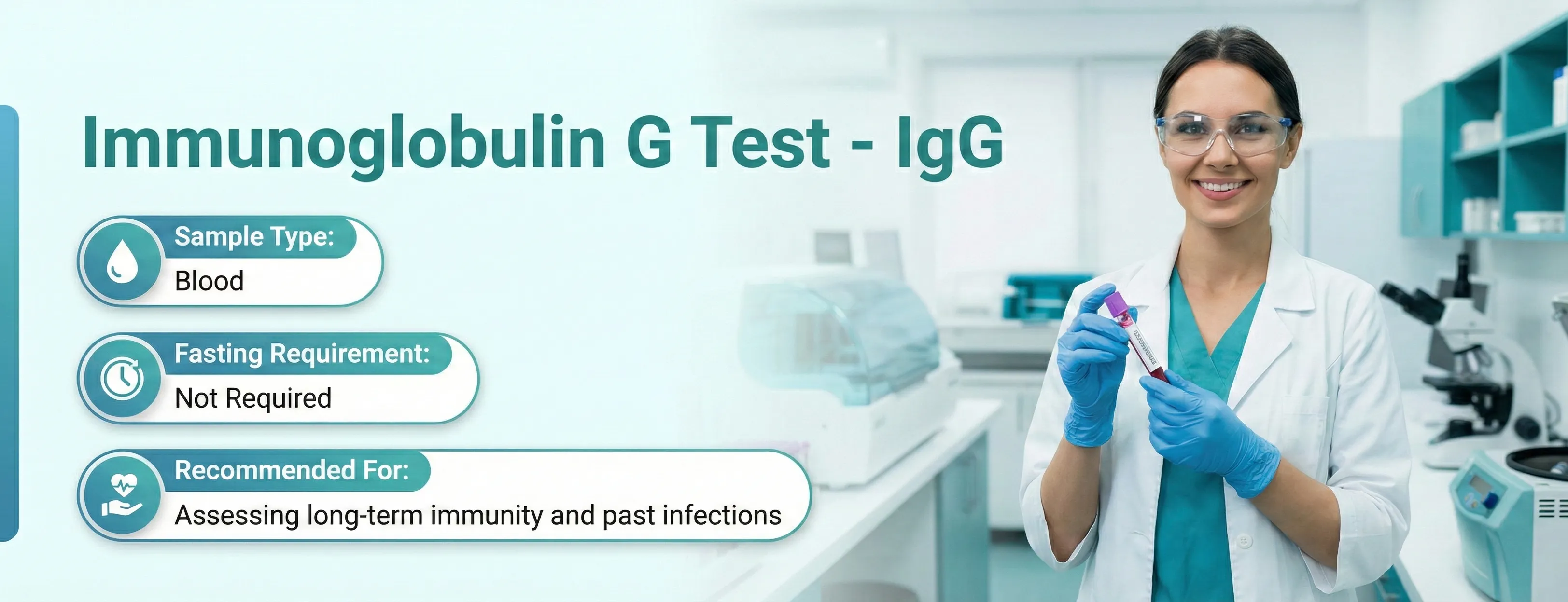35+ orders placed in your location
100% NABL & ISO Certified Lab • 100% Accurate Reports
Immunoglobulin G Test - IgG
Immunoglobulin G test, IgG Test, IgG Serum Test, IgG Antibody Test
- SummaryThe Immunoglobulin G (IgG) Test measures the level of IgG antibodies in the blood, which play a crucial role in long-term immunity and fighting infections. It helps assess immune function, detect chronic infections, or diagnose immune deficiencies. This test uses a blood sample, requires no fasting, and is suitable for individuals of all age groups and genders, based on a doctor’s recommendation.Read more
- Reports Within13 HrsView Sample Report100% NABL & ISO Certified Labs
- SampleBlood
- AgeAll Age Group
- GenderMale and Female
- FastingNot Required
PharmEasy Promises
Know More About The Test
A quick info on Immunoglobulin G Test - IgG
Overview
The immune system of our body protects us from bacteria, viruses, and other microorganisms. In response to these disease-causing organisms, our immune system produces specific proteins called immunoglobulins. These immunoglobulins protect us from infection. The test, which measures the amount of Ig proteins in the blood, saliva, or cerebrospinal fluid (CSF) (fluid surrounded by the brain and spinal cord) is Immunoglobulin G (IgG) test.
When disease-causing microorganisms or foreign substances (also known as antigens) infect a person, our immune system recognises it. The immune system cells produce specific immunoglobulins (also called antibodies) against the antigens. When the same infection re-occurs, our body remembers it and produces more antibodies rapidly to prevent the re-infection.
Our immune system produces five types of immunoglobulins:
- Immunoglobulin M (IgM)
- Immunoglobulin G (IgG)
- Immunoglobulin A (IgA)
- Immunoglobulin D (IgD)
- Immunoglobulin E (IgE)
Immunoglobulin G (IgG) is the most common type of antibody present in the body. It is found in all body fluids and comprises 70-80% of all immunoglobulins present in the body. IgG provides long-term protection against infection. They memorise the microorganisms and develop specific antibodies against them. They also prevent the recurrence of the infection. It is the only immunoglobulin that can pass from mother to baby through the placenta during pregnancy. IgG from the mother protects the baby in the first few months after birth. There are four subclasses of IgG:
- IgG1
- IgG2
- IgG3
- IgG4.
The immunoglobulin test measures the amount of each Ig: IgA, IgM, and IgG. Separate testing is done to measure the subclasses of IgG. If the levels of Ig are low or high, it may indicate the presence of some health problem. The test shows whether the immune system of our body is working correctly. If the level is low, the immune response is low, and there are more chances of getting an infection. A high level means the immune response is overactive, and you could have allergies.
Symptoms for deficiency or excess of IgG differ greatly. There may be frequent infections, fever, skin rashes, sinus infection, diarrhoea, allergies, or a lung infection. The IgG test is also prescribed if you have a family history of immunodeficiency. It can detect bacterial infections, low immunity, autoimmune disorders, cancers like multiple myeloma, and also infections in newborns.
IgG tests are easily available in India. Recently, during the COVID-19 pandemic, the antibody IgG test was used to determine the presence or absence of antibodies after the infection and vaccination. IgG antibodies usually become positive after 8 - 13 days of infection & peak around 21 days.
The test is not used to diagnose the active infection though.
Other names of IgG Test
- Quantitative immunoglobulins G test
- Immunoglobulin G test
- IgG test
- IgG Serum test
- Immunoglobulin IgG antibody testing
What does the IgG test detect/measure, and who is this prescribed for?
The IgG test measures the levels of Immunoglobulin G in the body.
If a person is experiencing the following conditions, doctors may ask you to get an IgG test:
- Unexplained weight loss
- Diarrhoea for a long time (Chronic Diarrhoea )
- Frequent fever
- Frequent infections
- Skin rashes
- Allergies
- Sinus infection
In such cases, an IgG test is prescribed by the physician to check the level of immunity. It can also be prescribed to check the presence of antibodies after the body recovers from the infection.
There are some disease conditions for which an Immunoglobulin G test is prescribed are
- Multiple myeloma
- HIV/AIDS infection
- Leukaemia
- Pneumonia
- Autoimmune disorders like Rheumatoid arthritis
- Family history of immunodeficiency
- Infection in the lungs, stomach, or intestine
- Chronic illness
- Post-recovery from illness
- Post-vaccination
The IgG test is for both males and females of all ages. The IgG test results are affected by alcohol, use of certain medications for seizures and arthritis, vaccination in the past 6 months, a booster dose of vaccine, radiation, and chemotherapy. Consult your doctor and tell them about all the ongoing medications and treatments.
Sample Type
The IgG test requires a blood sample. In some cases, the test is done using other body fluids, like CSF or saliva.
Test Preparation
The IgG test is mostly done using blood samples that do not require fasting or any specific preparation. The blood is collected from a prominent vein of the arm.
In certain conditions related to our body's nerves, the IgG test requires the use of cerebrospinal fluid(CSF). The fluid surrounds the brain and spinal cord. A needle is inserted in the lower part of the spine (lumbar puncture) to collect the CSF, and fluid is drawn out carefully by an ordering consultant. It can be a painful process. The doctor will numb your pain and prescribe you painkillers.
Another way to measure the IgG level is by taking a saliva sample for the test. The most common method to measure IgG is by a blood test.
Test inclusions: What parameters are included?
The IgG test parameter includes the range of Immunoglobulin G in the blood. The result of the IgG test shows the amount of IgG in g/L or mg/dL. If the value is at the low side of the range, it suggests low immunity. If the value is on the higher side, it suggests an overactive immune system. The IgG test results are also described as positive or negative IgG regarding the presence or absence of IgG antibodies in the body.
The test does not diagnose any disease or condition. It shows the level of immunity. Along with other tests, it helps in the diagnosis and management of a disease.
How frequently should you take this test?
Your doctor will prescribe the Immunoglobulin G test according to your health status. The quantitative immunoglobulin test, along with other tests, helps with the diagnosis of the disease that affects the body's immune system. Once the medication has started, the health practitioner may prescribe the IgG test at regular intervals to assess the body's antibodies and immune response.
Risk Assessment
Pneumonia, Multiple myeloma, Rheumatoid arthritis, Leukaemia, HIV/AIDS
Ranges
Age | Normal range (In g/L) |
Up to 2 weeks | 5.0 – 17.0 |
2 – 4 weeks | 3.9 – 13.0 |
1 – 3 month | 2.1 – 7.7 |
3 – 6 months | 2.4 – 8.8 |
6 – 9 months | 3.0 – 9.0 |
9 – 12 months | 3.0 – 10.9 |
1 – 2 years | 3.1 – 13.8 |
2 – 3 years | 3.7 – 15.8 |
3 – 6 years | 4.9 – 16.1 |
6 – 15 year | 5.4 – 16.1 |
Over 16 years | 6.0 – 16.0 |
During the initial days of pregnancy, the IgG level increases and after 20 weeks it becomes normal.
Females tend to have higher levels of IgG compared to males.
Test Result Interpretation
The following interpretation of the IgG test can be made as per the range.
If the result of the Immunoglobulin G test shows a lower value of the IgG than normal, it may be indicative of
- Kidney disease
- Malnutrition
- Diabetes complications
- Severe burn injury
- Weakened immunity like in HIV/AIDS infection
If the result of the Immunoglobulin G test shows a higher value of the IgG than normal, it may be indicative of
- Autoimmune disorder
- Hepatitis
- Multiple Myeloma(type of cancer)
- Cirrhosis
- Liver disease
- Allergies
- Chronic infection
If the test results are not normal, it doesn't mean you have the above-mentioned conditions. It means that your immune response is either high or low. The consulting doctor will advise you further according to your condition and test results.
The IgG antibody test can also be determined as positive or negative in response to specific antibodies.
- Positive: if antibodies are present after the infection has passed
- Negative: if antibodies are not present after the infection has passed or no recent back history of infection/ disease.
Was This Test Information Helpful?
Please rate your experience
References
People Also Ask
What is considered a high IgG level?
What is an abnormal IgG level?
What is a good IgG level for Covid?
What is positive IgG?
What does IgG indicate?
Have any doubts? Ask us.
Ask us anything about the Immunoglobulin G Test - IgG to understand it better
We provide trusted, expert-curated health content to support better awareness,prevention, and care.
Backed by experienced doctors, medical experts, and strict editorial standards.


